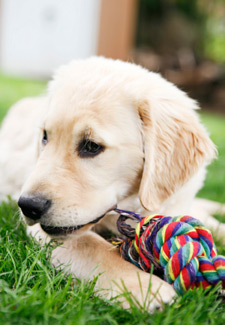Why Puppies Chew — and What You Can Do About It
Published on April 19, 2012

The best prevention is vigilance and good housekeeping. Remove everything chewable from your puppy's reach. Puppies especially like to chew stuffed furniture, wooden objects, leather objects and that perennial favorite, shoes. Because you can't pick up everything, don't let your puppy wander around the house unsupervised. Keep her in a puppy-proof room when you can't watch her. As an extra precaution, you can slather bitter-tasting products (available from your veterinarian or pet supply store) on objects you don't want your puppy to sample.
Give Your Puppy Something to Chew On
But puppies are driven to chew, so you must give your puppy something acceptable to gnaw on. Choose chews carefully: no old shoes, no socks, no carpet remnants, nothing that resembles anything she could find around the house. What a puppy learns to chew on at an early age will tend to be what she looks for to chew on for the rest of her life. Only let your pup have a few options at a time, rotating them every few days so she has the excitement of new chews and toys.
Your choice of chews will depend on your dog’s chewing power; some dogs chew with such gusto that they swallow big hunks, which can cause a potentially fatal impaction, while others have tender mouths and need smaller, softer chews. Rawhide, for example, is fine for some dogs, but others gulp down large hunks and can become very ill from it. Real bones should be avoided because they can cause fractures of teeth that can bring hefty dental bills. They can also damage the mouth, stomach and intestines. Consider the following chew options:
- Interactive toys, such as those that can be filled with soft cheese, dog treats or peanut butter. You can freeze them after filling to make them last even longer.
- Chewing toys that can be soaked in water and frozen, providing relief for teething puppies.
- Chew bones designed to promote dental wellness.
Break the Chewing Habit
Chewing can also result from boredom. Dogs, whether puppies or adults, can chew because there's nothing else to do. Most dogs do not get enough exercise, and since they can't watch television or read a book, they turn to their doggy entertainment center, which too often is your closet or new chair. Give your dog more exercise, both mental and physical, to stave off destructive chewing. And again, be sure to provide her with more enticing acceptable things to chew on and play with.
Some cases of chewing aren't because of puppy impulses or boredom, but from anxiety. Chewing that occurs when the dog is left alone, especially if it occurs around doors and windows or if it is accompanied by scratching and digging, may be a sign of separation anxiety. Such dogs are stressed about being left alone; they spend the time panting, drooling and trying to find ways to escape and come find you. They also often urinate and defecate out of anxiety. Under natural circumstances, a puppy’s separation from her dam would be cause for distress, bringing on distressed yelping and efforts to rejoin them. Without her human or canine leader, a dog can become fearful, and after repeated episodes, that fear becomes associated with being alone. Separation anxiety can occur in dogs of all ages. Punishing the dog only makes it worse; instead, you need to work on a program of gradual desensitization to being left alone, leaving the dog for only a few minutes at a time. Talk to your veterinarian about other steps you can take.
Inappropriate chewing is not just damaging; it’s dangerous. Chewing electrical cords can lead to shocks and electrocution. Eating drugs and poisons has led to the death of many dogs. Although eating paper currency is an expensive habit, swallowing a single penny can be more expensive; unless it is removed, the penny may stay in the stomach and release zinc, resulting in zinc poisoning. Swallowing stockings and socks can lead to intestinal blockages, requiring surgery. Prevention will save you money — and, perhaps, your puppy's life!





